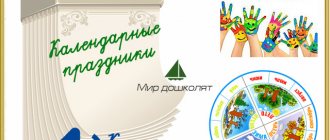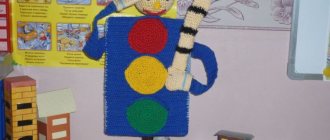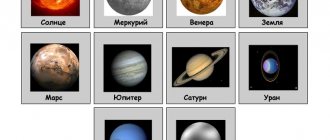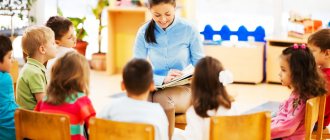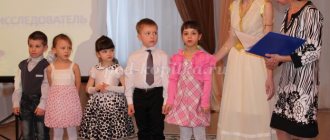My family traditions
Parent conference at the preschool educational institution.
One of the tasks of our kindergarten is to promote the development and strengthening of the family as a social institution by involving parents in cooperation and participation in raising children.
Tasks:
- promote the observance of existing family traditions and the emergence of new ones;
promote the exchange of experience in family education and traditions;- improve the pedagogical culture of parents;
- look for new forms of interaction between teachers and parents.
Materials and equipment:
A4 sheet with a family tree, pencils, scissors, silhouette of a lamb made of cardboard, glue pencil, woolen threads, napkins; musical accompaniment; threads and ribbons for games, prizes for each child; scarves for the game "Yurt".
Progress of the event
(Families are invited to the music room; each family has a separate table.)
Leading:
Dear parents! Today we have gathered to talk about family, family traditions and their importance in the upbringing and development of a preschool child. Before starting our conversation, I offer you a warm-up “What do we know about the family.”
What is the Latin word for "family". (Surname.)
Now say “family” in Italian. (Mafia.)
As you know, the Greek goddess Athena was the goddess of wisdom, and the owl was considered her bird. But the goddess Hera, the wife of Zeus, was considered the patroness of family and motherhood. Guess which bird was considered the “bird of Hera”? (Stork.)
What is the Russian “fruit” proverb about someone who has inherited bad, unseemly behavior from their father or mother? ("The apple never falls far from the tree".)
What Russian toy is this quote from the encyclopedia about: “It personifies the idea of a strong family, prosperity, procreation, and carries the idea of unity”? (About the nesting doll.)
Leading:
Dear parents!
How do you calculate who has the leading role in raising a child – the family or the kindergarten? (Answers from parents.)
The priority in raising a child undoubtedly belongs to the family.
What do you think the word “family” means? (Answers.)
For a long time, home and family have always been spoken of with love and respect. Legends, fairy tales, proverbs and sayings about family have come down to us from ancient times. Let's try to remember them.
Being a guest is good, but being at home is better).
The hut is not red in its corners, but... (red in its pies).
As it is at home, so is it... (yourself).
Children are not a burden, but... (a joy).
When the family is together and... (heart in the right place).
Leading:
The moral health of a family, its spiritual values and, consequently, its potential educational capabilities can be judged by the traditions established in it. I invite you to answer the questions now.
What do you think is included in the concept of “family traditions”?
What family traditions do you have in your family?
Do family traditions influence the upbringing of a child?
What positive character traits do they foster in a child? (Parents' answers.)
Leading:
So let's look at our traditions. One of the traditions of every family is celebrating a birthday.
child.
And what is a holiday without a gift and surprise? Now we propose to play the “Choose a Gift” game. ( A rope is stretched across the room and gifts wrapped in paper are hung on it. The child’s eyes are closed, untwisted, and he must cut off some gift with scissors.)
Presenter:
Another tradition is compiling a family tree.
We suggest now compiling a pedigree for your family. Start with your children. (Leaflets with a picture of a family tree are distributed, and the participants in the parent conference write down their pedigree, time to complete the task is 5 minutes.)
Presenter:
Who had the most numerous clan? Do you know where your parents and grandparents are from? Who came up with the name you have?
Leading:
Look, our hall is decorated with photographs from family albums. Unfortunately, in the modern computer world, this tradition is receding more and more into the background. But, however, the selection of photographs, the design of album pages is exactly the communication that a child needs in his joint activities with his parents. In addition, memorial certificates and documents about achievements can be placed in the album - a family archive.
Leading:
Another good tradition is playing with your child. Play is a child’s life, not preparation for life. There are a lot of games and toys. You should carefully and thoughtfully approach their selection.
Role-playing game:
the main type of games for preschoolers. During this game, the child tries on various social roles, puts himself in social situations that he could see in the real life of adults.
Outdoor games:
Children are very active and restless, which is why outdoor games are so important. In them, children can realize their need for movement, improve their motor skills and abilities, and develop such physical qualities as speed, agility, and strength.
Folk games:
help maintain cultural traditions and connections between generations. We invite you to play with us one of the Bashkir folk games “Yurt”.
The game involves four subgroups of children, each of which forms a circle at the corners of the site. In the center of each circle there is a chair on which a scarf with a national pattern is hung. Holding hands, everyone walks in four circles at alternating steps and sings:
We are funny guys
Let's all gather in a circle,
Let's play and dance
And let's rush to the meadow.
At the end of the music, they quickly run to their chairs, take a scarf and pull it over their heads in the form of a tent (roof), it turns out to be a yurt. The first group of children to build a yurt wins.
Leading:
Family meals are also a wonderful tradition.
You can communicate at the table on any topic - discuss news, events of the day. The benefits of family dinners together are enormous. Firstly, it is helping children acquire language. Secondly, such family dinners provide a sense of family cohesion. And, of course, a family dinner is an occasion for your favorite dishes! Now each family will share their signature dishes. (Discussion.)
And we also have our own tradition - to end any event with tea. And today we will not violate it. After all, our parents prepared sweet dishes.
Gulnara Gaffanova, teacher, Liliya Fayzullina, teacher,
Olga Nikiforova, senior teacher
MBDOU D/s No. 59 Salavat rep. Bashkortostan
All-Russian conferences for teachers
We invite you to take part in all-Russian conferences from the “Time of Knowledge” media. Remote conferences are designed for continuous learning and sharing your experience among colleagues. Certificates contain a mark of editorial verification of the material and the Internet address where the material will be available. Participation in conferences for teachers has a positive effect on certification and allows you to gain additional points.
Catalog of reports Send a report Without registration Fill out the application and download the report Pay for the certificate issue Receive the document in 5 minutes All-Russian media “Time of Knowledge” -
Certificate of registration EL No. FS 77 - 63093 dated September 18, 2015
, issued by the Federal Service for Supervision of Communications , information technology and mass communications.
The cost of participation in conferences is 250 rubles 200 rubles
(editorial review of the material and posting on the website, issuance of a Conference Participant Certificate in electronic form).
Participation in the conference as a SPEAKER Step 1.
Fill out the application for participation and download your report
Step 2.
Pay the editorial fee for participation in the conference
200 rubles Step 3.
Wait for the application to be verified by the editors and a certificate is issued (no more than 10 minutes)
Step 4.
Download certificate on your report page in the Report Catalog
Participation in the status of a speaker →
Participation in the conference in the status of LISTENER Step 1.
Fill out the application for participation
Step 2.
Pay the editorial fee for participation in the conference
200 rubles Step 3.
Wait for the application to be verified by the editors and a certificate is issued (no more than 10 minutes)
Step 4.
The certificate will be sent to you by email after your application is verified (no more than 10 minutes)
Participation as a listener
Topics of pedagogical conferences for 2021:
- Pedagogy. Modern approaches to training and education
- Modern educational technologies as a means of improving the quality of education
- Health-saving technologies in the educational process of preschool educational institutions
- Interactive methods in the educational process
- Effective methods and techniques in educational activities
- Information and communication technologies in the educational process according to the Federal State Educational Standard
- Development of creative abilities of preschool children
- Development of creative abilities of school-age children
- Patriotic education of children and adolescents
- Physical development of children in preschool educational institutions
- Technologies for cooperation between teachers and parents
- Professional competence of a teacher
- Professional self-development of a teacher
- Fundamentals of correctional pedagogy and special psychology
- The role of play in the life of a preschooler
- Modern lesson: effective organization of the educational process
- Age-related developmental crises in schoolchildren and psychological assistance
Sample conference participant certificate:
Organizer - All-Russian media "Time of Knowledge" Certificate of registration EL No. FS 77 - 63093 dated September 18, 2015, issued by the Federal Service for Supervision of Communications, Information Technologies and Mass Communications.
Summary of the event for educators and teachers of preschool educational institutions topic: “A look from the outside”
Summary of the event for educators and teachers of preschool educational institutions
topic: “A view from the outside”
Kiyaykina Natalya Fedorovna
educational psychologist
MBDOU kindergarten No. 31 “Zarya”
Pyatigorsk
Stavropol Territory
Target:
creating favorable conditions for the development of psychological competencies of kindergarten teachers, taking into account the implementation of the Federal State Educational Standard for Education.
Tasks:
increasing the psychological literacy of educators and teachers through film therapy;
development of sympathy and empathy;
developing discussion skills after watching a film;
diagnostics of the content of projection in the statements of teachers;
monitoring the emotional state of event participants while watching the film and discussing it;
generalization of teachers’ knowledge on children’s rights;
correction of negative emotional states;
formation of a successful outcome of the plot.
Equipment:
music center with soundtrack, computer, internet resource (video film “About the Hedgehog” https://www.family2children.ru/Kinoterapiya_kinolektorii_deti).
Participants:
kindergarten teachers and educators.
Progress of the event:
Music sounds, teachers enter the office of the educational psychologist and sit down on comfortable poufs.
1.
Greeting.
Teacher-psychologist: “Good afternoon, colleagues! I welcome you to our “little theater.” Greet each other using non-verbal means of communication.”
Teachers demonstrate nonverbal communication skills.
2.
Psychological attitude.
Neurogymnastics “Familiar Mudras”.
The educational psychologist invites participants to perform familiar “mudras” to activate brain activity.
All participants perform familiar finger and breathing exercises.
3.
Mini-conversation “Why have we gathered…”.
Discussion of the rules of communication in the process of activity.
Group work rules:
- speak on your own behalf;
— when asking questions, express your point of view;
- interpret what you see in the film, and not the statements of other participants;
- be aware of the subjectivity of your perception;
- speak up one by one;
- You are responsible for everything you do in the group.
Before watching the film, the presenter offers participants instructions: “Now we will watch a film called “About the Hedgehog.” Try to watch it carefully in order to understand how the behavior and speech of the kindergarten teacher affects the lives of children. We cannot understand people's feelings and thoughts except through their external manifestations, that is, through behavior and speech. You need to be attentive to how the characters in the film act and act. I wish you a good viewing."
4. Watching the film “About the Hedgehog”.
https://www.family2children.ru/Kinoterapiya_kinolektorii_deti
The presenter announces the preface: “One day in the Soviet Union, an ordinary boy learns what it means to be different from the rest. In kindergarten, he comes to the New Year's party in a costume that is different from the costumes of other children... Does he have the right to simply be the way he is. We have to answer this question.”
5. Diagnostics-discussion of the film watched.
The content of the activity consists of the statements of the group participants, on the basis of which the discussion is based. The facilitator supports the discussion at this stage.
Participants in a circle are asked to describe their feelings and sensations from the film they watched and identify the most memorable episodes.
The teacher-psychologist creates conditions for the audience to “I-statement”:
— What did you see in this film?
— What did you see that allows you to say that?
The use of first-person statements creates conditions for developing the ability to differentiate one’s views, assessments and positions from the assessments of other people. Participants construct “I-statements” about the content of the film, while they always have the opportunity to speak out about their own experiences.
By observing the teachers, the facilitator determines what emotions they have accumulated in excess and how to help them free themselves from them. The teacher-psychologist creates the general psychological situation and carries out correction.
An educational psychologist monitors the state of group members while watching a movie and discussing it (help, support). The content of the film may cause noticeable emotional reactions in group members during viewing.
Working with negative experiences.
6. Mini-conversation with the participants of the meeting on violations of children’s rights in the video film watched:
— What rights of the child were violated by the teacher?
— What rights do preschoolers have?
— How could the current situation be resolved?
Discussion of the situation taking into account the implementation of the Federal State Educational Standard for Educational Education at the present stage of development of a harmonious personality.
Child's rights
After the discussion is completed, the facilitator summarizes the discussion.
7. Reflection.
The meeting ends with feedback from the event participants.
Literature
1. Film therapy: a flexible method for correcting psychological problems
https://psixika.ru/146-filmoterapiya.html
2. Berezin S.V. Cinema therapy and film training. A practical guide for psychologists and social workers.
3. Video film “About the Hedgehog”
https://www.family2children.ru/Kinoterapiya_kinolektorii_deti
Regulations on holding the All-Russian Distance Pedagogical Conference
Dear Colleagues!
The Einstein Center for the Growth of Talented Children and Teachers (Mass Media Registration Certificate EL No. FS 77 - 69923, registered by the Federal Service for Supervision of Communications, Information Technologies and Mass Communications, ROSKOMNADZOR, Moscow) invites you to take part in the XI All-Russian Distance Pedagogical conference “Pedagogy and psychology in the modern world: innovative methods of teaching and education in the context of current challenges of our time” .
Publishing the results of their own theoretical and practical research is an excellent opportunity for teachers to present their materials for discussion by colleagues and experts, receiving a qualified, friendly assessment of the result of their work.
All authors of papers submitted to the Conference receive
All-Russian distance pedagogical conference. Based on the results of the Conference, it will be published.
The Conference certificate contains a note on the editorial review of materials (required for certification), as well as the topic of the published report. Participation in a pedagogical conference helps to gain additional points in the certification.
| Dates: August 01, 2021 – December 31, 2021 Acceptance of works: 24 hours a day, 7 days a week. Participants: teachers of preschool educational institutions (educators, educational psychologists, speech therapists, speech pathologists, etc.); teachers of general educational institutions (schools, gymnasiums, lyceums, etc.); teachers of primary, secondary and higher education institutions (schools, technical schools, colleges, higher educational institutions); teachers of additional education institutions. Registration fee for participation: 110 rubles (one report is provided for the Conference, which is published in an electronic collection, the participant receives a certificate of participant-speaker of the Conference). Preparation of a conference participant certificate: daily, the next day after sending the application for participation in the Conference and paying the registration fee (section RESULTS after 19-00 Moscow time). | ORDERING FEE FOR 1 REPORT 110 rub. apply | |
| How to take part in the conference: Step 1: Submit an electronic application for participation in the All-Russian Pedagogical Conference, attaching your report (article) to the application. Step 2: Pay the registration fee for participation in the amount of 110 rubles when creating an application for the Conference or on the PAYMENT page in any way convenient for you. Step 3: Within 24 hours, the report (article) undergoes editorial review. The participant is included in the list of registered participants of the XI All-Russian Distance Pedagogical Conference “Pedagogy and Psychology in the Modern World: Innovative Methods of Teaching and Education in the Context of Current Challenges of Our Time.” Step 4: The next day after sending the application for participation in the Conference and payment of the registration fee, it will be sent to your email. Step 5: After January 1, 2022, download an electronic collection of articles from the Conference participants from the Conference page. | ||
| Sample certificate of participant-speaker of the XI All-Russian Distance Pedagogical Conference “Pedagogy and Psychology in the Modern World: Innovative Methods of Teaching and Education in the Context of Current Challenges of Our Time” The following information is included in the Conference participant certificate: - unique registration number of the certificate; — theme of the All-Russian Distance Pedagogical Conference; — Full name, position, name of the educational institution of the Conference participant; — topic of the Conference participant’s report; — date of the Conference; — information on the registration of the mass media of the TsRTDP “Einstein” in Roskomnadzor; — official seal and signature of the editor-in-chief of the Einstein CRDP. | ||
COMPLETED CONFERENCES
X All-Russian Distance Pedagogical Conference “Training and Education 2021: Implementation of Educational and Professional Standards in Modern Conditions”
List of registered participants
Regulations on the X All-Russian Distance Pedagogical Conference “Training and Education 2021: Implementation of Educational and Professional Standards in Modern Conditions”
IX All-Russian Distance Pedagogical Conference “Training and Education 2021: Implementation of Educational and Professional Standards in Modern Conditions”
List of registered participants
Regulations on the IX All-Russian Distance Pedagogical Conference “Training and Education 2020: Implementation of Educational and Professional Standards in Modern Conditions”
VIII All-Russian Distance Pedagogical Conference “Teacher of the 21st Century: Innovative Methods and Traditional Approaches in the Modernization of Russian Education”
List of registered participants
Regulations on the VIII All-Russian Distance Pedagogical Conference “Teacher of the 21st Century: Innovative Methods and Traditional Approaches in the Conditions of Modernization of Russian Education”
VII All-Russian Distance Pedagogical Conference “Modern education and upbringing in the context of the implementation of the Federal State Educational Standard: traditions, experience, innovations”
List of registered participants
Regulations on the VII All-Russian Distance Pedagogical Conference “Modern education and upbringing in the context of the implementation of the Federal State Educational Standard: traditions, experience, innovations”
VI All-Russian distance pedagogical conference “Teacher of the XXI century: innovative methods and traditional approaches in the context of the implementation of the Federal State Educational Standard”
List of registered participants
Regulations on the VI All-Russian Distance Pedagogical Conference “Teacher of the 21st Century: Innovative Methods and Traditional Approaches in the Context of the Implementation of the Federal State Educational Standard”
V All-Russian distance pedagogical conference “Teacher of the XXI century: innovative methods and traditional approaches in the context of the implementation of the Federal State Educational Standard”
List of registered participants
Regulations on the V All-Russian Distance Pedagogical Conference “Teacher of the 21st Century: Innovative Methods and Traditional Approaches in the Context of the Implementation of the Federal State Educational Standard”
IV All-Russian distance pedagogical conference “Teacher of the 21st century: innovative methods and traditional approaches in the context of modernization of Russian education”
List of registered participants
Regulations on the IV All-Russian Distance Pedagogical Conference “Teacher of the 21st Century: Innovative Methods and Traditional Approaches in the Modernization of Russian Education”
III All-Russian distance pedagogical conference “Modern education and upbringing: traditions and innovations”
List of registered participants
Regulations on the III All-Russian Distance Pedagogical Conference “Modern Education and Upbringing: Traditions and Innovations”
II All-Russian distance pedagogical conference “Modern education and upbringing: problems, approaches, solutions”
List of registered participants
Regulations on the II All-Russian Distance Pedagogical Conference “Modern education and upbringing: problems, approaches, solutions”
I All-Russian Distance Pedagogical Conference “Teacher of the 21st Century: Modern Approaches to Teaching and Education”
List of registered participants
Regulations on the holding of the I All-Russian Distance Pedagogical Conference “Teacher of the 21st Century: Modern Approaches to Teaching and Education”
